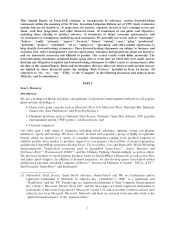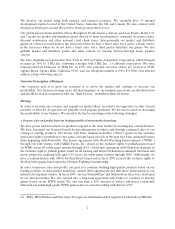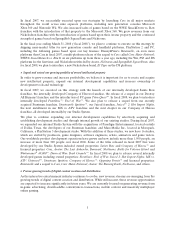THQ 2007 Annual Report Download - page 19
Download and view the complete annual report
Please find page 19 of the 2007 THQ annual report below. You can navigate through the pages in the report by either clicking on the pages listed below, or by using the keyword search tool below to find specific information within the annual report.
11
We rely on arelatively small number of licensed brands forasignificant portion of our sales.
Gameswe develop basedupon asmallnumber of licensed brands make up asubstantial portionof our
sales each year. In fiscal 2007, sales of titles for our three top-selling brands, Disney • Pixar,Nickelodeon
and World WrestlingEntertainment (“WWE”) comprised 54% of our net sales; in fiscal2006, 47% of our
net sales were based on titles from such brands; andin fiscal 2005, 52%of ournetsales were based on
titles fromsuch brands. Alimited numberoflicensed brands may continue to produce a disproportionately
large amount of oursales. Dueto this dependence on alimited number of brands, thefailureof oneor
more products based on these brands to achieve anticipated results or the loss of alicense pursuant to
which we develop games for such brands may significantlyharm our businessandfinancial results.
We are currently involved in litigation withtheWWE with respect to our video gamelicense. Since WWE
titles make up a significant portionof our sales, our inability to retain the licensecould harm us. See,
Item 3 “Legal Proceedings” for a more detailed discussion of this litigation.
Our inability to acquire or createintellectual property rights which have a high level of consumer
recognition or acceptance could harm us.
Asignificant portion of our net sales arederived from products based on popular licensed properties.A
decrease in the popularity of the underlyingpropertyof our licenses could negatively impact our ability to
sell products based on such licenses.
We alsogeneraterevenue from wholly-owned intellectual property. The success of our internal brands
depends on our ability to create original ideaswhich appeal to the avid gamer. Titles based on wholly-
owned intellectual property can be expensive to develop and market since they do not have a built-in
consumer base or licensorsupport. Our inability to create new products targeted at the core gamer could
negativelyimpact our operations.
Our inability to enter intoagreements withthe manufacturers to develop, publish and distributetitles on
theirplatforms could seriously impact ouroperations.
We aredependent on the platform manufacturers (Microsoft, Nintendo and Sony) and our non-exclusive
licenses with them, both for the right to publish titles for their platforms andfor the manufacture of our
products fortheir platforms. Ourexisting platform licenses require that we obtain approval forthe
publication of new games on a title-by-title basis. As aresult, thenumberoftitleswe areable to publish for
these platforms, and our sales from titles for these platforms, may be limited.Should any manufacturer
choosenot to renew or extendourlicense agreement at the end of its current term, or if any licensewas
terminated, we would be unable to publish additional titles for that manufacturer’s platform, which could
negatively affect our operating results.
Additionally, since each of the manufacturers publish games for its own platform, and also manufactures
products for allof its other licensees, a manufacturer may give priority to its ownproducts or those of
other publishers in theevent of insufficient manufacturing capacity. Unanticipateddelays in thedelivery of
products duetodelayed manufacturing couldalso negatively affect our operating results.
Video game product development schedules are difficultto predict and can be subject to delays.
Postponements in shipments can substantially impact our earnings in any given quarter.
Our abilitytomeet productdevelopmentschedulesis affected by anumber of factors, includingthe
creative processes involved, thecoordination of largeand sometimes geographically dispersed
development teams requiredbythe increasing complexity of our products, and theneed to refine and tune
ourproducts prior to their release. We have in thepast experienced development delays for several of our
products. Failure to meet anticipated production schedules may cause a shortfall in our expected sales and
























